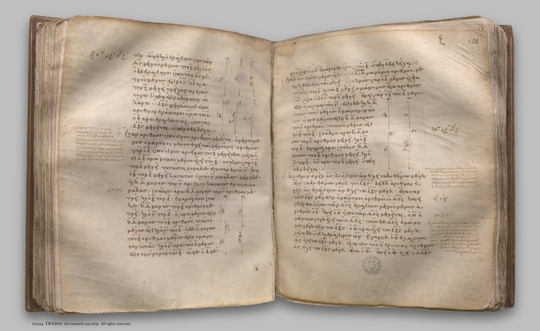index prev | digilib folio 147

To find the number which is the least that will have given parts.
| Ἀριθμὸν εὑρεῖν, ὃς ἐλάχιστος ὢν ἕξει τὰ δοθέντα μέρη. Ἔστω τὰ δοθέντα μέρη τὰ Α, Β, Γ: δεῖ δὴ ἀριθμὸν εὑρεῖν, ὃς ἐλάχιστος ὢν ἕξει τὰ Α, Β, Γ μέρη. Ἔστωσαν γὰρ τοῖς Α, Β, Γ μέρεσιν ὁμώνυμοι ἀριθμοὶ οἱ Δ, Ε, Ζ, καὶ εἰλήφθω ὑπὸ τῶν Δ, Ε, Ζ ἐλάχιστος μετρούμενος ἀριθμὸς ὁ Η. Ὁ Η ἄρα ὁμώνυμα μέρη ἔχει τοῖς Δ, Ε, Ζ. τοῖς δὲ Δ, Ε, Ζ ὁμώνυμα μέρη ἐστὶ τὰ Α, Β, Γ: ὁ Η ἄρα ἔχει τὰ Α, Β, Γ μέρη. λέγω δή, ὅτι καὶ ἐλάχιστος ὤν. εἰ γὰρ μή, ἔσται τις τοῦ Η ἐλάσσων ἀριθμός, ὃς ἕξει τὰ Α, Β, Γ μέρη. ἔστω ὁ Θ. ἐπεὶ ὁ Θ ἔχει τὰ Α, Β, Γ μέρη, ὁ Θ ἄρα ὑπὸ ὁμωνύμων ἀριθμῶν μετρηθήσεται τοῖς Α, Β, Γ μέρεσιν. τοῖς δὲ Α, Β, Γ μέρεσιν ὁμώνυμοι ἀριθμοί εἰσιν οἱ Δ, Ε, Ζ: ὁ Θ ἄρα ὑπὸ τῶν Δ, Ε, Ζ μετρεῖται. καί ἐστιν ἐλάσσων τοῦ Η: ὅπερ ἐστὶν ἀδύνατον. οὐκ ἄρα ἔσται τις τοῦ Η ἐλάσσων ἀριθμός, ὃς ἕξει τὰ Α, Β, Γ μέρη: ὅπερ ἔδει δεῖξαι. | To find the number which is the least that will have given parts. Let A, B, C be the given parts; thus it is required to find the number which is the least that will have the parts A, B, C. Let D, E, F be numbers called by the same name as the parts A, B, C, and let G, the least number measured by D, E, F, be taken. [VII. 36] Therefore G has parts called by the same name as D, E, F. [VII. 37] But A, B, C are parts called by the same name as D, E, F; therefore G has the parts A, B, C. I say next that it is also the least number that has. For, if not, there will be some number less than G which will have the parts A, B, C. Let it be H. Since H has the parts A, B, C, therefore H will be measured by numbers called by the same name as the parts A, B, C. [VII. 38] But D, E, F are numbers called by the same name as the parts A, B, C; therefore H is measured by D, E, F. And it is less than G : which is impossible. |